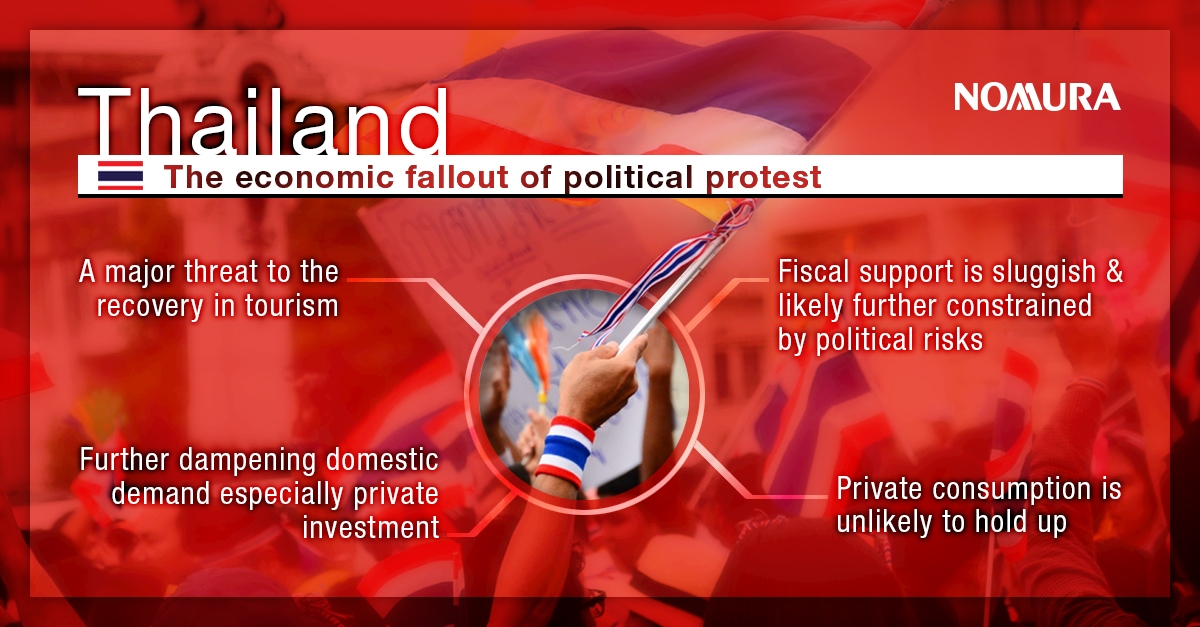
Thailand: The Economic Fallout of Political Protests – This Time is No Different
- Student-led protests in Thailand likely to further affect the already weak economic outlook.
- We have lowered our full-year 2021 GDP growth forecast to 3.2% from 3.8%, penciling in the weakest rebound in ASEAN despite the low base effects.
- This supports our out-of-consensus call for 50bp policy rate cuts by the Bank of Thailand by Q1 2020, taking the policy rate to 0%.
Student-led protests have resumed in Thailand, demanding constitutional changes and reforms to the monarchy. With the political situation still highly fluid, we perform a scenario analysis of possible outcomes. In our base case, to which we assign a 60% probability, the political stalemate is extended for several months similar to 2013-14 episodes. Another scenario is where protests lose momentum, but we the probability is low at 10%. The probability for a third scenario where the protests escalate to more violence in the short-term similar to 2010 is also low at 10%, in our view. The final scenario where the government makes some major concessions helping to end the protests in the next few months is also unlikely, and we assign still-low 20% likelihood to this outcome.
While the nature of these protests is fundamentally different to previous ones, the economic fallout is likely to be quite similar. Taking into account our base case scenario of a prolonged political conflict, we now forecast 2020 GDP growth at -6.9%, the worst since the 1997 Asian Financial Crisis. The impact should start to materialize in the final two months of 2020 and will be quite substantial: we forecast our Q4 GDP growth at -7.4% y-o-y which would represent a deterioration from -6.4% in Q3. The drag is not from tourism, which is already quite weak, but more from the slower recovery in domestic demand, amid the still-sluggish implementation of fiscal measures and slow budget disbursement.
For next year, we expect the effects to become more pronounced in H1 2021, through an even slower recovery in tourism and the likely sharp drop in sentiment in the real sector, and thus revised down more significantly our full-year 2021 growth forecast to 3.2% from 3.8%, suggesting an even weaker economic recovery from the Covid-19 pandemic. Our forecast implies growth will only turn positive in Q2, helped mainly by the low base effect. Our previous GDP growth forecast for 2021 was already well below consensus forecasts of 4.1% and suggested the weakest rebound in the ASEAN region despite the low base effects.
We therefore anticipate two 25bp policy rate cuts by the Bank of Thailand by Q1 2021, taking the policy rate to a new record low of 0%, with the first 25bp reduction likely delivered at the Monetary Policy Committee meeting on 23 December.
In terms of the implications for THB, we found in our recent surveys that investors may have a more sanguine view of the political situation. The largest share of investors (41.7%) expected modest THB depreciation against USD (0-2%) by H1 2021, assuming there is a prolonged conflict with some violence like in 2013-14. 19.4% of respondents expected THB to depreciate by 2-4% (against USD), while only 2.9% expected THB to depreciate by more than 4%. Notably, 35.9% expected THB to appreciate, but due to the improved global outlook.
As the current situation takes place against the Covid-19 backdrop, some of the channels through which the unrest is transmitted could be more potent than others. On one hand, tourism, arguably the largest channel, has already suffered significantly. On the other hand, political risks may compound the lingering effects of the pandemic on domestic demand and hamper the rebound in tourism upon the availability of a vaccine, undermining the overall recovery in economic activity, already seemingly fragile. Our new forecast indicates only a limited recovery in the key engine of GDP growth (tourism revenue accounted for 11.5% of GDP in 2019). This reflects our assumption that the risk of political unrest will discourage tourists amid the risk of a continued rise in Covid-19 cases globally. In our view, this suggests only a limited recovery in tourist arrivals, especially in H1, before a pickup in H2 after the political situation de-escalates.
For more insight into the economic effects stemming from Thailand’s political uncertainties, read our full report.
Contributor

Charnon Boonnuch
Asia Economist

Euben Paracuelles
Week Ahead Podcast Host and Chief ASEAN Economist

Craig Chan
Global Head of FX Strategy

Wee Choon Teo
Strategist, Asia ex-Japan

Dushyant Padmanabhan
Asia Rates & FX Strategist

Chetan Seth
APAC Equity Strategist
Disclaimer
This content has been prepared by Nomura solely for information purposes, and is not an offer to buy or sell or provide (as the case may be) or a solicitation of an offer to buy or sell or enter into any agreement with respect to any security, product, service (including but not limited to investment advisory services) or investment. The opinions expressed in the content do not constitute investment advice and independent advice should be sought where appropriate.The content contains general information only and does not take into account the individual objectives, financial situation or needs of a person. All information, opinions and estimates expressed in the content are current as of the date of publication, are subject to change without notice, and may become outdated over time. To the extent that any materials or investment services on or referred to in the content are construed to be regulated activities under the local laws of any jurisdiction and are made available to persons resident in such jurisdiction, they shall only be made available through appropriately licenced Nomura entities in that jurisdiction or otherwise through Nomura entities that are exempt from applicable licensing and regulatory requirements in that jurisdiction. For more information please go to https://www.nomuraholdings.com/policy/terms.html.


